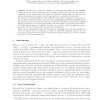Free Online Productivity Tools
i2Speak
i2Symbol
i2OCR
iTex2Img
iWeb2Print
iWeb2Shot
i2Type
iPdf2Split
iPdf2Merge
i2Bopomofo
i2Arabic
i2Style
i2Image
i2PDF
iLatex2Rtf
Sci2ools
TCC
2004
Springer
2004
Springer
A Universally Composable Mix-Net
We show how to public-key obfuscate two commonly used shuffles: decryption shuffles which permute and decrypt ciphertexts, and re-encryption shuffles which permute and re-encrypt ciphertexts. Given a trusted party that samples and obfuscates a shuffle before any ciphertexts are received, this reduces the problem of constructing a mix-net to verifiable joint decryption. We construct a decryption shuffle from any additively homomorphic cryptosystem and show how it can be public-key obfuscated. This construction does not allow efficient distributed verifiable decryption. Then we show how to public-key obfuscate: a decryption shuffle based on the Boneh-Goh-Nissim (BGN) cryptosystem, and a re-encryption shuffle based on the Paillier cryptosystem. Both constructions allow efficient distributed verifiable decryption. In the Paillier case we identify and exploit a previously overlooked “homomorphic” property of the cryptosystem. Finally, we give a distributed protocol for sampling and o...
Related Content
| Added | 02 Jul 2010 |
| Updated | 02 Jul 2010 |
| Type | Conference |
| Year | 2004 |
| Where | TCC |
| Authors | Douglas Wikström |
Comments (0)

